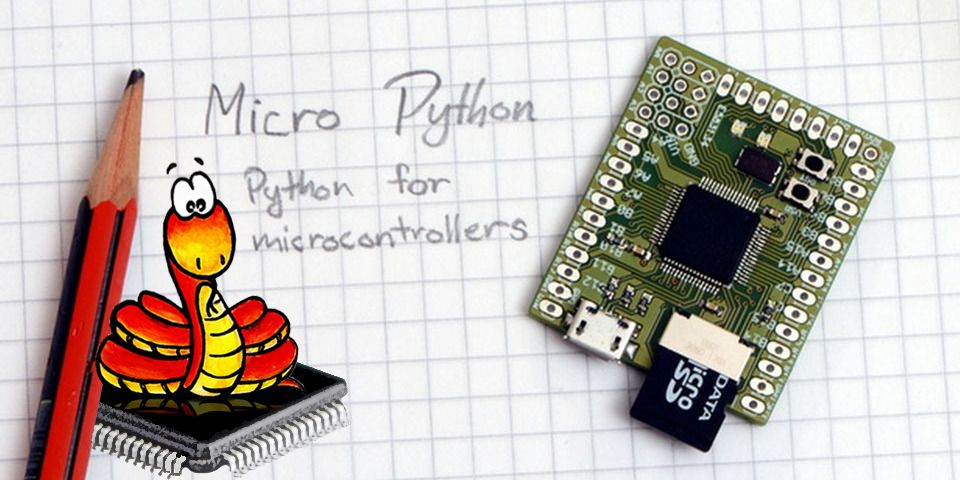同步操作将从 leida_3669/micropython-rocky 强制同步,此操作会覆盖自 Fork 仓库以来所做的任何修改,且无法恢复!!!
确定后同步将在后台操作,完成时将刷新页面,请耐心等待。


This is project is cloned from MicroPython project, which aims to put an implementation of Python 3.x on microcontrollers and small embedded systems. You can find the official website at micropython.org.
WARNING: this project is in beta stage and is subject to changes of the code-base, including project-wide name changes and API changes.
MicroPython implements the entire Python 3.4 syntax (including exceptions,
with, yield from, etc., and additionally async/await keywords from
Python 3.5). The following core datatypes are provided: str (including
basic Unicode support), bytes, bytearray, tuple, list, dict, set,
frozenset, array.array, collections.namedtuple, classes and instances.
Builtin modules include sys, time, and struct, etc. Select ports have
support for _thread module (multithreading). Note that only a subset of
Python 3 functionality is implemented for the data types and modules.
MicroPython can execute scripts in textual source form or from precompiled bytecode, in both cases either from an on-device filesystem or "frozen" into the MicroPython executable.
See the repository http://github.com/micropython/pyboard for the MicroPython board (PyBoard), the officially supported reference electronic circuit board.
Major components in this repository:
Additional components:
The subdirectories above may include READMEs with additional info.
"make" is used to build the components, or "gmake" on BSD-based systems. You will also need bash, gcc, and Python (at least 2.7 or 3.3).
The "unix" port requires a standard Unix environment with gcc and GNU make. x86 and x64 architectures are supported (i.e. x86 32- and 64-bit), as well as ARM and MIPS. Making full-featured port to another architecture requires writing some assembly code for the exception handling and garbage collection. Alternatively, fallback implementation based on setjmp/longjmp can be used.
To build (see section below for required dependencies):
$ git submodule update --init
$ cd ports/unix
$ make axtls
$ make
Then to give it a try:
$ ./micropython
>>> list(5 * x + y for x in range(10) for y in [4, 2, 1])
Use CTRL-D (i.e. EOF) to exit the shell.
Learn about command-line options (in particular, how to increase heap size
which may be needed for larger applications):
$ ./micropython --help
Run complete testsuite:
$ make test
Unix version comes with a builtin package manager called upip, e.g.:
$ ./micropython -m upip install micropython-pystone
$ ./micropython -m pystone
Browse available modules on PyPI. Standard library modules come from micropython-lib project.
Building MicroPython ports may require some dependencies installed.
For Unix port, libffi library and pkg-config tool are required. On
Debian/Ubuntu/Mint derivative Linux distros, install build-essential
(includes toolchain and make), libffi-dev, and pkg-config packages.
Other dependencies can be built together with MicroPython. This may be required to enable extra features or capabilities, and in recent versions of MicroPython, these may be enabled by default. To build these additional dependencies, first fetch git submodules for them:
$ git submodule update --init
Use the same command to get the latest versions of dependencies, as
they are updated from time to time. After that, in the port directory
(e.g. ports/unix/), execute:
$ make deplibs
This will build all available dependencies (regardless whether they
are used or not). If you intend to build MicroPython with additional
options (like cross-compiling), the same set of options should be passed
to make deplibs. To actually enable/disable use of dependencies, edit
ports/unix/mpconfigport.mk file, which has inline descriptions of the options.
For example, to build SSL module (required for upip tool described above,
and so enabled by dfeault), MICROPY_PY_USSL should be set to 1.
For some ports, building required dependences is transparent, and happens automatically. They still need to be fetched with the git submodule command above.
The "rt1050_60" port supports GCC toolchain (as mpy official) and KEIL. To build under keil, just open KEIL project in "prj_keil_" folder. To build under GCC, requires an ARM compiler, arm-none-eabi-gcc, and associated bin-utils. For those using Arch Linux, you need arm-none-eabi-binutils, arm-none-eabi-gcc and arm-none-eabi-newlib packages. Otherwise, try here: https://launchpad.net/gcc-arm-embedded
To build:
$ git submodule update --init
$ cd ports/nxp_rt105
$ make
MicroPython and OpenMV are open-source projects and welcome contributions. To be productive, please be sure to follow the Contributors' Guidelines and the Code Conventions. Note that MicroPython is licenced under the MIT license, and all contributions should follow this license.
此处可能存在不合适展示的内容,页面不予展示。您可通过相关编辑功能自查并修改。
如您确认内容无涉及 不当用语 / 纯广告导流 / 暴力 / 低俗色情 / 侵权 / 盗版 / 虚假 / 无价值内容或违法国家有关法律法规的内容,可点击提交进行申诉,我们将尽快为您处理。